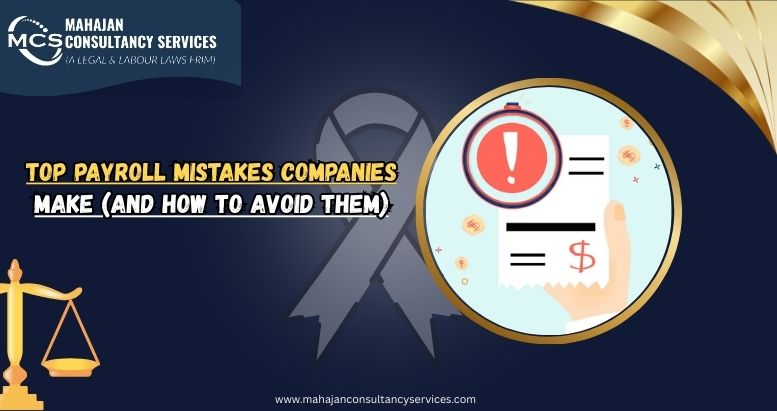Payroll is more than calculating salaries. It involves statutory deductions, record keeping, tax compliance and timely payments to employees and authorities. When companies make mistakes in any of these areas, the consequences can be expensive. These can include penalties from PF and ESI departments, TDS mismatches, employee disputes, reputational damage and even labour inspections. For companies in Amritsar and across India, payroll compliance is becoming stricter every year. Even a small oversight can lead to costly complications.
This article explains the top payroll mistakes companies make and provides practical ways to avoid them. With labour laws evolving and audits becoming more frequent, employers must be more vigilant than ever. At the end, you will also see how Mahajan Consultancy can support your organisation with fully compliant payroll services.
Misclassification of Employees
One of the most common payroll mistakes is misclassifying employees. Businesses often categorise workers as trainees, consultants or contract staff without understanding the statutory implications. Under Indian labour laws, especially the PF and ESI Acts, the nature of work and relationship determines whether an individual is an employee, not the title given by the company.
When companies misclassify workers, they may skip PF, ESI or bonus payments. This becomes a serious compliance violation. During inspections, authorities can demand contributions for past months or even years, along with interest and damages. To avoid such risks, companies should evaluate every role clearly and classify workers strictly as per statutory definitions. Maintaining clear contracts, onboarding documents and job descriptions also helps during audits.
Incorrect Salary Calculations
Payroll mistakes often begin with inaccurate salary structures. If companies miscalculate components like basic wages, allowances, overtime, arrears or deductions, the errors reflect not only on salary slips but also on statutory filings. For example, PF contributions must be calculated on basic wages plus certain allowances. Many organisations incorrectly exclude components or use outdated wage ceilings.
Incorrect overtime calculations can also cause employee disputes and even labour court cases. The Factories Act and Shops and Establishments Acts specify mandatory overtime rates. If payroll teams fail to apply these correctly, employees may file complaints with labour authorities. To prevent these problems, businesses should use standardised salary structures and ensure payroll staff is trained in statutory wage components.
Missing Statutory Deadlines
Every payroll department must follow strict timelines. PF, ESI and TDS deposits have fixed deadlines. If companies miss these, they face interest, penalties and risk of inspections. Similarly, monthly returns like PF ECR, ESI returns and quarterly TDS statements must be filed on time.
Small businesses often struggle with deadlines when payroll staff are overloaded or when holidays and month-end rush clash. The solution is to maintain a compliance calendar with reminders. Payroll software and outsourcing to professionals like Mahajan Consultancy can also ensure that no statutory deadline is ever missed.
Poor Record Keeping
Authorities expect employers to maintain several payroll records. These include attendance registers, wage registers, leave records, salary slips, PF and ESI challans, inspection notes and employee personal files. During audits, missing documents can create compliance issues even if salaries were paid correctly. Companies may have to recreate data, which is time consuming and rarely accurate.
Digital payroll systems make record keeping easier. Companies should ensure all records are stored securely and backed up regularly. Physical registers should also be updated where required, depending on the industry and state laws.
Not Updating Payroll with Changing Laws
Payroll compliance changes frequently. PF wage ceilings, ESI contribution rates, bonus eligibility limits and minimum wages are revised periodically. Many businesses continue using outdated rates, which leads to errors in contributions and payments. Authorities can demand retrospective corrections which can become a huge financial burden.
To avoid this, payroll teams should stay informed through government notifications and expert updates. Hiring payroll consultants in Amritsar also ensures your business stays aligned with every statutory change. Mahajan Consultancy, for example, monitors updates from EPFO, ESIC, the Labour Department and the Income Tax Department to keep clients fully compliant.
Incorrect TDS Deductions
TDS is a major area of payroll errors, especially for companies without an in-house tax expert. Problems arise when employers apply wrong slab rates, ignore employee declarations, fail to consider investment proofs or miscalculate exemptions. This leads to Form 16 mismatches, employee dissatisfaction and possible notices from the Income Tax Department.
The safest approach is to use automated tax calculation tools and verify employee declarations carefully. Businesses should also reconcile salaries and tax deductions every quarter to avoid last-minute errors at the end of the financial year.
Failure to Provide Proper Salary Slips
Some employers issue handwritten or informal salary slips, while others do not issue them at all. This is a compliance risk and also creates issues for employees when applying for loans, visas or government schemes. Salary slips must include name, designation, month, earnings, deductions, net pay and statutory contribution details. They must be accurate and must match company records.
Using payroll software or outsourcing the payroll process ensures employees receive error-free salary slips every month. This improves transparency and reduces disputes.
Not Verifying Attendance Correctly
Many payroll errors start at the attendance level. Incorrect attendance records result in wrong salary calculations, excess leave deductions or unauthorized payments. These issues frustrate employees and increase administrative workload.
Companies should use biometric systems or reliable attendance software to track working hours, shifts and leaves. The payroll team must also coordinate with HR to verify attendance before finalising salary each month.
Ignoring Reimbursements and Allowances
Reimbursements such as travel, telephone, meal and medical expenses are often processed late or without supporting documents. If reimbursements are not correctly categorised, they may be treated as taxable income, affecting both employees and the company.
Payroll teams should create a clear reimbursement policy and ensure that all claims are submitted with valid proof. A proper workflow helps avoid duplicate payments and tax errors.
Not Conducting Payroll Audits
Many companies only realise payroll mistakes when they receive notices from authorities. A regular internal payroll audit helps identify discrepancies before they grow into legal issues. This includes reviewing salary structures, statutory deductions, record keeping practices and attendance systems.
Employers in Amritsar can benefit from external payroll compliance audits conducted by Mahajan Consultancy. These audits help businesses detect errors early and maintain a clean compliance record.
How Mahajan Consultancy Helps Prevent Payroll Mistakes
Professional payroll management reduces risks, improves efficiency and ensures complete legal compliance. Mahajan Consultancy supports businesses in Amritsar with end to end payroll services including salary calculation, statutory deductions, ECR filing, ESI returns, TDS processing, payroll audits and complete documentation for inspections. Their expertise ensures that your organisation avoids costly mistakes and stays compliant throughout the year.
FAQs
- What are the most common payroll mistakes companies make?
Common mistakes include incorrect salary calculations, missing deadlines, wrong PF and ESI deductions, poor record keeping and outdated compliance practices. - Can payroll mistakes lead to legal penalties?
Yes. Errors related to PF, ESI, minimum wages and TDS can lead to fines, interest, inspections and even prosecution in serious cases. - How do payroll mistakes affect employees?
They can result in salary delays, incorrect deductions, tax issues and disputes that affect morale and retention. - What is the best way to avoid payroll deadlines being missed?
Using compliance calendars, automated reminders and outsourcing work to payroll professionals helps ensure timely filings. - Why is employee classification important in payroll?
Misclassification affects PF and ESI eligibility and can lead to retrospective contributions with penalties. - Should small businesses use payroll software?
Yes. Payroll software reduces manual errors, automates statutory calculations and ensures accurate record keeping. - What documents must employers maintain for payroll compliance?
Wage registers, attendance records, salary slips, PF and ESI challans, TDS records and employee files. - How often should payroll audits be done?
At least once a year, or more frequently for fast growing businesses or companies facing recurring compliance issues. - Why do TDS errors occur in payroll?
They occur due to wrong slab rates, incorrect declarations, missing proofs or miscalculations of exemptions. - How can Mahajan Consultancy support companies in payroll compliance?
They provide complete payroll processing, statutory filing, record maintenance, audits and expert guidance to prevent errors and ensure compliance.




